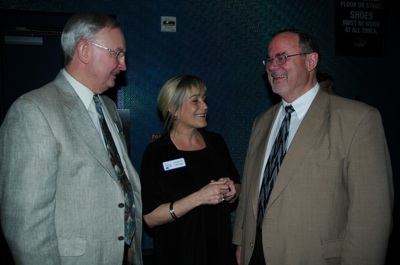TULALIP — “Every legislative session has its own pace,” said Gary Chandler, vice president of government affairs for the Association of Washington Business. “This one hasn’t found theirs yet.”
Chandler told the Greater Marysville Tulalip Chamber of Commerce on March 25 that he hopes the 2011 session of the state Legislature will meet their goal of completing a budget draft before Easter, because he doesn’t see the next forecast getting any better than the most recently released one.
“We’re going to be $5.1 billion short in the next biennium,” Chandler told the Chamber during its monthly Business Before Hours meeting. “We told the legislators this was coming. We told them that the housing market was a false economy and that they needed to hang onto that money.”
During his “Eye on Olympia” presentation, Chandler identified the earthquake and tsunami in Japan, as well as U.S. military intervention in Libya, as factors which are already compounding the pre-existing economic recession, by driving oil prices even higher and hindering imports and exports to and from Japan.
“The biggest piece is the housing market, though,” Chandler said. “The market is just not moving, and we’re still looking at another 10 percent drop in housing value before it might finally turn around in 2013.”
Chandler predicted that state funds for education would continue to be reduced, and advocated saving money by deregulating education through the removal of unfunded mandates.
“The Legislature passes good policies, but without the dollars to support them,” Chandler said. “We should be giving our school districts the money they need per student and telling them that we don’t care how they get their students to meet standard, as long as they do. The regulations shouldn’t be the same here as they are for schools in Moses Lake.”
Chandler also suggested raising state employees’ health care copay to meet the same percentage as private employees, and warned against being too quick to repeal tax incentives.
“Every tax incentive has jobs tied to it,” Chandler said. “They make us more competitive with other states for attracting employers, which raises our wage base, which yields more tax revenues. We need to look at each of these tax incentives to see how well it does that, but employers won’t reinvest in our state if those tax incentives are potentially put on the chopping block every two years, because you can’t run a business that way.”
Chandler noted that privatizing liquor sales and allowing video poker in private casinos have also been considered as options to help pay down the budget. He added that the state is considering moving money from its capital funds into its general funds again, just as it did two years ago, which he deemed a mistake.
“Capital projects create jobs,” Chandler said. “Instead of constantly buying new land, let’s put that money into constructing new schools and new sewer systems, and put people to work in the process.”
With fewer people driving and purchasing gas, Chandler pointed out that there’s less revenue from the gas tax for the transportation budget. To compensate for lost gas tax revenues, Chandler listed the possibilities of charging the owners of electric cars more money, as well as instituting tolls or even toll lanes.
“We could turn the HOV lane into the Autobahn,” Chandler laughed.
Although Chandler reported the good news that the state’s business community has saved roughly $350 million in unemployment insurance rate reductions, he nonetheless warned that the state’s workers compensation is in pressing need of reform, not only because the current system is expected to incur double-digit increases, but also because so many businesses don’t even understand the existing rules.
“Have you ever ready the L&I?” Chandler asked his audience. “I haven’t either, and one of my biggest fears is that their agency will come knocking at my door. We can’t keep up with all the paperwork.”


